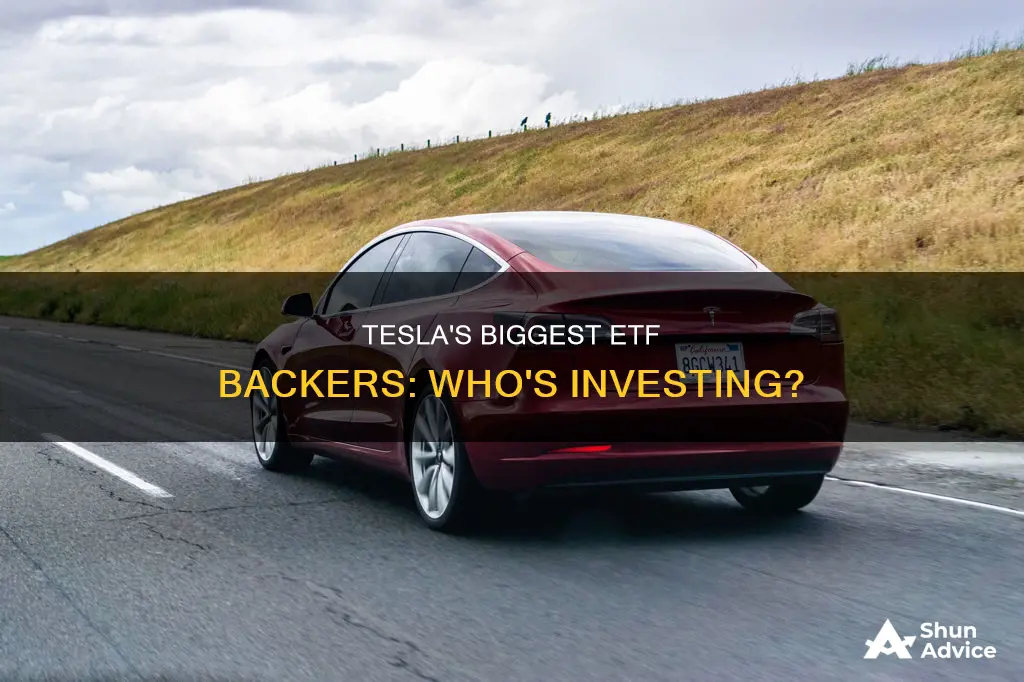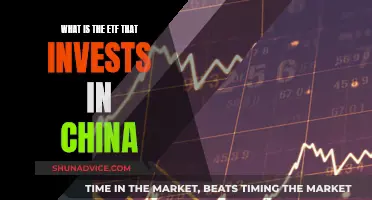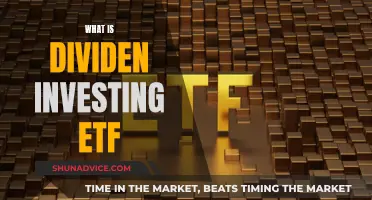
Tesla is a major player in the consumer discretionary sector and is one of the hottest companies on the market, with an incredible P/E ratio of 1,076.31. However, it is also one of the most volatile stocks. For investors looking to gain exposure to Tesla in a diversified manner, there are several ETFs to consider. Here is an introduction to the topic of ETFs that are heavily invested in Tesla.
What You'll Learn

ETFs with Tesla Inc (TSLA) exposure
Tesla is a major part of the consumer discretionary sector and is included in many ETFs. Here are some of the top ETFs with Tesla exposure:
ARK Innovation ETF (ARKK)
ARKK is one of the most well-known ETFs and has a large stake in Tesla, with the company being its largest holding at just under 10% of the fund. The fund also includes other disruptive technology stocks like Coinbase and Block. ARK Innovation ETF has a Neutral ETF Smart Score of 5 out of 10 and has returned around 27.4% year-to-date.
ARK Autonomous Technology & Robotics ETF (ARKQ)
Another ETF from ARK Invest, ARKQ also has a large position in Tesla, with the company being its largest holding at 13.7%. The fund has a more specific focus on artificial intelligence (AI) and robotics and includes stocks like Nvidia, Deere, and Kratos. ARKQ has returned 17.5% year-to-date and has assets under management (AUM) of over $900 million.
Invesco QQQ Trust (QQQ)
The Invesco QQQ Trust, also known as "The Q's", is one of the most popular ETFs in the market. It invests in the Nasdaq 100 and has a low expense ratio of 0.2%. Tesla makes up 3.5% of the fund, and other top holdings include Amazon, Microsoft, and Apple. QQQ has a Smart Score of 8 out of 10 and has returned over 20% year-to-date.
First Trust NASDAQ Clean Edge Green Energy ETF (QCLN)
QCLN's primary objective is to track the NASDAQ Clean Edge Green Energy Index by investing the majority of its assets in securities that make up the underlying index. Tesla is the third-largest holding in the fund at 8% of the portfolio. Other significant holdings include NIO Inc, Albemarle Corporation, and SolarEdge Technologies. QCLN has an annual management fee of 0.6% and has $464 million in AUM.
VanEck Vectors Low Carbon Energy ETF (SMOG)
The VanEck Vectors Low Carbon Energy ETF seeks to provide similar returns to the Ardour Global Index Extra Liquid (AGIXLT) by investing a minimum of 80% of its assets in low-carbon energy companies, including Tesla, Vestas Wind Systems, and Eaton Corporation. Tesla accounts for 14.21% of the fund's portfolio. SMOG has an annual management fee of 0.62% and has $142.6 million in net assets.
Direxion Daily TSLA Bull 1.5X Shares ETF (TSLL)
TSLL is a leveraged ETF that seeks daily investment results of 150% of the common shares of Tesla by employing leverage. It is a risky investment and is not suitable for the average investor as it can amplify both gains and losses. TSLL has a high expense ratio of 1.08% and only holds cash and Tesla in its portfolio.
Schwabb ETF Investment: Best Options for Your Money
You may want to see also

ETFs with the highest percentage of Tesla holdings
There are several ETFs with high exposure to Tesla stock. Here are some of the ETFs with the highest percentage of Tesla holdings:
IShares U.S. Consumer Goods ETF (IYK)
The iShares U.S. Consumer Goods ETF has one of the highest percentages of Tesla holdings, with the electric car maker accounting for 15.3% of its portfolio. However, it should be noted that this ETF also invests in 93 other consumer stocks, which may dilute the impact of Tesla's performance.
VanEck Vectors Low Carbon Energy ETF (SMOG)
The VanEck Vectors Low Carbon Energy ETF is a fund that invests in small- and mid-capitalization low-carbon energy companies, including Tesla. As of 2020, Tesla was the fund's top allocation, accounting for 14.21% of its portfolio. The fund has an annual management fee of 0.62% and has delivered strong returns, with a five-year annualized return of 10.73% as of September 2020.
ARK Autonomous Technology & Robotics ETF (ARKQ)
The ARK Autonomous Technology & Robotics ETF is another fund with a large position in Tesla, with the company being its largest holding at 13.7%. This ETF focuses on artificial intelligence and robotics and also includes stocks like Nvidia, Deere, and Kratos. ARKQ has delivered a gain of 17.5% year-to-date as of April 2023.
First Trust NASDAQ Clean Edge Green Energy ETF (QCLN)
The First Trust NASDAQ Clean Edge Green Energy ETF has 13.42% of its portfolio invested in Tesla. This fund primarily invests in U.S.-listed companies that are involved in clean energy technologies. It has an annual management fee of 0.6% and has delivered strong returns, with a YTD return of 62.33% as of September 2020.
ARK Innovation ETF (ARKK)
The ARK Innovation ETF is a well-known fund that has Tesla as its largest holding, with a weighting of just under 10%. This ETF focuses on "disruptive technology" stocks and has delivered a gain of 27.4% year-to-date as of April 2023. However, it is important to note that it also includes some stocks with lower Smart Scores, which may warrant caution.
These ETFs offer investors a way to gain exposure to Tesla while also diversifying their investments across a range of industries and companies.
ETFs: Smart Small-Amount Investing for Beginners
You may want to see also

ETFs with Tesla as a core holding
Tesla is a major part of the consumer discretionary sector and is one of the hottest companies on the market. However, it is also one of the most volatile stocks. Here are some ETFs with Tesla as a core holding:
VanEck Vectors Low Carbon Energy ETF (SMOG)
Launched in 2007, SMOG seeks to provide similar returns to the Ardour Global Index Extra Liquid (AGIXLT). It invests a minimum of 80% of its assets in small- and mid-capitalisation low-carbon energy companies, primarily in the alternative energy space. Tesla is the fund's top-weighted allocation, accounting for 14.21% of its portfolio. Other top holdings include Vestas Wind Systems A/S (VWDRY) at 10.15% and Eaton Corporation PLC (ETN) at 8.15%. SMOG charges an annual management fee of 0.62% and has $142.6 million in net assets. As of September 2020, it has a five-year annualised return of 10.73% and a three-year annualised return of 16.02%.
ARK Industrial Innovation ETF (ARKQ)
Formed in September 2009, ARKQ invests in companies likely to benefit from automation or technological innovation. While it invests in both domestic and foreign securities, 86.12% of its exposure targets US companies. Tesla is the fund's top allocation at 9.5%. Materialise NV (MTLS) and 2U Inc. (TWOU) are also among the top three holdings. ARKQ has a five-star rating from Morningstar and assets under management (AUM) of $317 million. Its expense ratio is 0.75%, higher than the 0.55% category average. As of September 2020, ARKQ has three- and one-year annualised returns of 25.47% and 26.1%, respectively.
First Trust NASDAQ Clean Edge Green Energy ETF (QCLN)
QCLN's primary objective is to track the NASDAQ Clean Edge Green Energy Index by investing the majority of its assets in securities that make up the underlying index. This includes US-listed companies that manufacture, develop, and install clean energy technologies. Tesla makes up 13.42% of its portfolio, with other significant holdings including NIO Inc ADR (NIO) at 9.59%, Albemarle Corporation (ALB) at 5.45%, and SolarEdge Technologies Inc (SEDG) at 5.33%. QCLN charges an annual management fee of 0.6%, offset by a 0.85% dividend yield. It has $464 million in AUM and a 62.33% YTD return as of September 2020.
ARK Innovation ETF (ARKK)
ARKK is one of the most newsworthy ETFs, with $7.5 billion in assets. Tesla is its largest holding, with a 10.2% stake. Other top holdings include Zoom Video Communications, Roku, and Coinbase Global. However, the fund has been making headlines for its 75.9% decline from its all-time high due to its focus on growth stocks. It has a high expense ratio of 0.75% due to its active management.
Invesco QQQ Trust (QQQ)
QQQ is one of the most popular ETFs today, with over $170 billion in assets under management. It invests in the Nasdaq 100 (NDX) and charges a low expense ratio of 0.2%. Tesla makes up 3.5% of the fund. QQQ has a Smart Score of 8 out of 10 and is viewed as a Moderate Buy, with an average price target implying 11.6% upside potential.
Direxion Daily TSLA Bull 1.5X Shares ETF (TSLL)
TSLL is a leveraged ETF that seeks daily investment results of 150% of Tesla's common shares by employing leverage. It has gained about 111% in 2023, but it is a risky investment due to its use of leverage. Any downward pressure on Tesla's shares will result in significant losses for TSLL. It has a high expense ratio of 1.08% due to its complex, actively-managed strategy.
ETFs: Minimum Investment Requirements and How They Work
You may want to see also

ETFs for environmentally focused investors
There are a variety of ETFs that environmentally focused investors can consider, depending on their specific interests and values.
Broad Clean Energy ETFs
These ETFs are involved in the alternative, renewable, and clean energy sectors. Examples include:
- Invesco WilderHill Clean Energy ETF (PBW): This fund selects companies focused on renewable energy sources and technology that facilitates cleaner energy. It has a large focus on holding small-cap firms and implements a growth strategy investment approach.
- IShares Global Clean Energy Fund (ICLN): This fund allocates its holdings to alternative energy, including solar and wind power, as well as companies involved in biomass, ethanol, and geothermal electricity production.
Wind Power ETFs
Wind power is another form of renewable energy that is gaining traction, with 115 countries having some level of commercial wind power capacity as of 2022. An example of a wind power ETF is:
First Trust Global Wind Energy ETF (FAN): This ETF is based on the ISE Global Wind Energy Index and includes companies actively engaged in the wind energy industry, such as wind farm development or wind-generated electricity distribution.
Solar Power ETFs
Solar power is another important source of renewable energy, with China, the United States, and Japan among the world leaders in solar innovation. An example of a solar power ETF is:
Invesco Solar ETF (TAN): This ETF is based on the MAC Global Solar Energy Index and tracks companies involved in the production of solar power equipment and fabrication products or services, as well as suppliers of raw materials.
Nuclear Power ETFs
Despite historical setbacks, nuclear power still accounts for a rapidly growing percentage of global electricity. An example of a nuclear energy ETF is:
Global X Uranium ETF (URA): This fund focuses on replicating the performance of the Solactive Global Uranium & Nuclear Components Total Return Index, with a heavy weight on Canadian uranium mining companies.
Other Environmentally Responsible ETFs
In addition to the broad categories above, there are numerous other environmentally responsible ETFs that investors can consider, depending on their specific interests and values. Here are some examples:
- Invesco MSCI Green Building ETF
- Fidelity Clean Energy ETF
- VanEck Office and Commercial REIT ETF
- Global X Renewable Energy Producers ETF
- ALPS Clean Energy ETF
- IShares MSCI Global Sustainable Development Goals ETF
- KraneShares MSCI China Clean Technology Index ETF
- ProShares S&P Kensho Cleantech ETF
- IShares Breakthrough Environmental Solutions ETF
- First Trust NASDAQ Clean Edge Green Energy Index Fund
- Global X Data Center And Digital Infrastructure ETF
- VanEck Low Carbon Energy ETF
- SPDR S&P Kensho Clean Power ETF
- Xtrackers US Green Infrastructure Select Equity ETF
ESG ETFs
ESG (Environmental, Social, and Governance) funds invest in companies that aim to have a sustainable and societal impact, such as those with a small carbon footprint or diverse leadership boards. Here are some examples of the best-performing and cheapest ESG ETFs:
Best-Performing ESG ETFs:
- IShares ESG Aware MSCI USA Growth ETF
- Nuveen Winslow Large-Cap Growth ESG ETF
- First Trust Multi-Manager Small Cap Opportunities ETF
- SPDR S&P SmallCap 600 ESG ETF
- Thrivent Small-Mid Cap ESG ETF
- Harbor Human Capital Factor Unconstrained ETF
- Schwab Ariel ESG ETF
Cheapest ESG ETFs:
- TCW Transform 500 ETF
- Xtrackers MSCI USA Climate Action Equity ETF
- IShares ESG Screened S&P 500 ETF
- Vanguard ESG U.S. Stock ETF
- FlexShares ESG & Climate US Large Cap Core Index Fund
- NYLI Candriam U.S. Large Cap Equity ETF
- Xtrackers MSCI USA ESG Leaders Equity ETF
Weed ETF Investment: Getting Started and Growing Your Portfolio
You may want to see also

ETFs for risk-averse investors
While Tesla is a popular and valuable company, it is also one of the most volatile stocks, making it a risky investment. If you are looking for ETFs that are suitable for risk-averse investors, here are some options and strategies to consider:
Money Market Funds: Money market funds are a type of mutual fund that invests in short-term debt instruments, cash, and cash equivalents. They are very low risk and structured so that each fund share is worth $1.00. While conservative, they tend to pay relatively low-interest rates.
Treasury Securities: Treasury securities, or debt issued by the US federal government, are considered the safest of all securities. Investors can access them through mutual funds, ETFs, or directly through the government's TreasuryDirect website.
Municipal and Corporate Bonds: Municipal and corporate bonds offer steady interest income and are typically lower risk than stocks. Risk-averse investors should focus on bonds issued by stable governments and healthy corporations with AAA ratings. Municipal bonds also offer tax advantages over corporate bonds.
Dividend Growth Stocks: Dividend growth stocks are shares of mature companies with proven track records and a steady flow of income. They regularly pay dividends, which can be reinvested to boost long-term growth. These stocks are often in defensive sectors, such as utilities and consumer staples, which are less affected by economic downturns.
High-Yield Savings Accounts: High-yield savings accounts from banks or credit unions provide stable returns with minimal investment risk. The FDIC and NCUA insure these accounts, guaranteeing the safety of your funds.
Certificates of Deposit (CDs): CDs offer slightly higher returns than savings accounts but require you to deposit your money for a fixed period. Early withdrawals may incur penalties. CDs are useful for diversifying your cash portfolio and can offer better returns than savings accounts.
Risk-Averse ETF Strategies: Some asset managers are now offering "risk-averse" crypto ETFs that use derivatives to minimise or protect against potential losses in cryptocurrencies like bitcoin. These ETFs allow investors to limit downside risk while surrendering some potential gains.
When considering any investment, it is essential to assess your risk tolerance and conduct thorough research. Remember that even low-risk investments carry some degree of risk, and diversification is key to managing risk effectively.
A Beginner's Guide to Investing in VOO ETF
You may want to see also
Frequently asked questions
As of 2023, some ETFs that are heavily invested in Tesla include:
- ARK Innovation ETF (ARKK)
- ARK Autonomous Technology & Robotics ETF (ARKQ)
- Invesco QQQ Trust (QQQ)
- Direxion Daily TSLA Bull 1.5X Shares ETF (TSLL)
- iShares U.S. Consumer Goods ETF (IYK)
- VanEck Vectors Low Carbon Energy ETF (SMOG)
- First Trust NASDAQ Clean Edge Green Energy ETF (QCLN)
- Simplify Volt TSLA Revolution ETF
Tesla is a major part of the consumer discretionary sector, and investors interested in the energy transition may prefer a thematic ETF.







